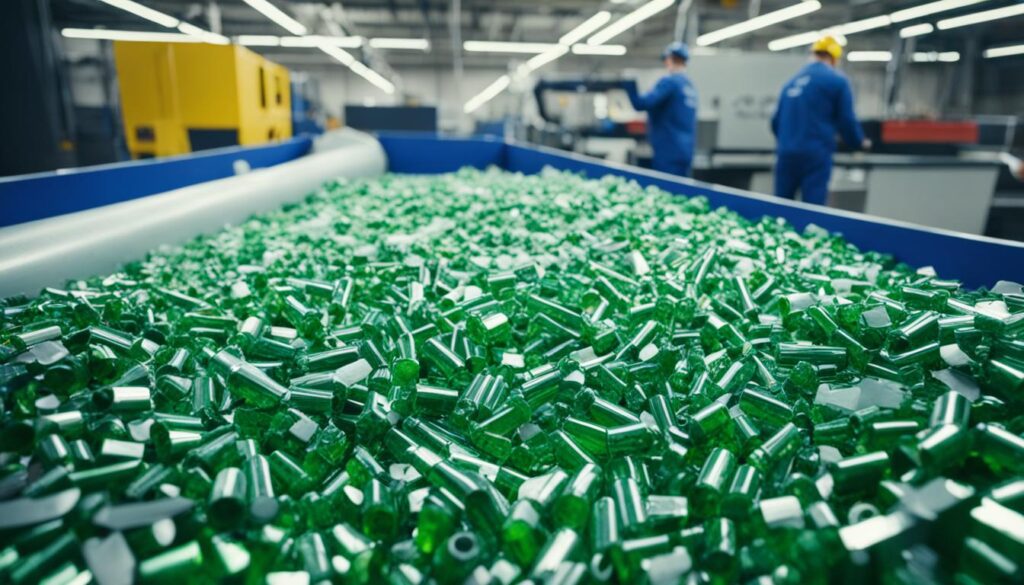Are you wondering how recycling technologies can truly transform the future? Discover how impressive innovations are revolutionizing the way we handle waste, creating a more sustainable world.
The generation of solid waste is a major environmental challenge. However, with technology, new solutions are emerging. These recycling technologies help reduce environmental impact and are both cost-effective and sustainable. Technological innovations show that a more sustainable future is possible.
Key Highlights
- Smart recycling technologies use advanced sensors and artificial intelligence. This improves recycling efficiency.
- Waste-to-Energy (WtE) converts waste into energy. This reduces the amount of waste in landfills.
- Nanotechnology assists in waste treatment. It uses nanoparticles to remove dangerous contaminants.
- 3D printing from recycled plastic waste encourages plastic recycling. This promotes the circular economy.
- It is crucial to have adequate policies and investments to support these innovations. This maximizes their positive impact on the environment and the economy.
Smart Recycling Technologies
Smart recycling is changing how we handle waste. With technological advances, we can separate and sort materials with greater precision. This greatly improves recycling efficiency. These innovations use advanced sensors and artificial intelligence to identify and sort materials like metals and plastics.
Advanced Sensors and Artificial Intelligence
Advanced sensors detect differences between materials, allowing for more waste sorting accuracy. With artificial intelligence algorithms, these sensors quickly identify and separate waste components. This greatly enhances the recycling process.
Increased Efficiency in Waste Separation
These smart recycling technologies make waste separation much more efficient. This helps recover more valuable materials and reduces the amount of waste sent to landfills. Robotics plays a key role in this process, assisting in material sorting and boosting productivity.
“Smart recycling is the future of waste management. It allows us to recover more valuable materials and drastically reduce environmental impact.”
These cutting-edge technologies are changing how we handle waste. They make recycling more efficient and sustainable.
Waste-to-Energy Conversion
Waste-to-Energy (WtE) technology converts waste into renewable energy. This not only reduces the amount of waste in landfills but also generates electricity, heat, and fuels from materials that would otherwise be discarded.
Conversion Processes like Pyrolysis
An important method is pyrolysis. It breaks down waste at high temperatures, creating gases. These gases are used to generate electrical and thermal energy. Pyrolysis is efficient and greatly reduces the amount of waste to be disposed of.

Production of Electricity, Heat, and Fuels
In addition to pyrolysis, there are other technologies for converting waste into energy. This includes incineration, anaerobic digestion, and co-processing in cement kilns. These techniques produce electricity, heat, and renewable fuels.
Studies show that energy recycling could increase electricity production in Brazil by up to 50 million megawatt-hours per year. This represents over 15% of the country’s total energy. Additionally, it could create up to 1 million new jobs.
“Energy recycling reduces the volume of waste sent to landfills, contributing to decreased greenhouse gas emissions and contamination of soil and water.”
With Brazil aiming for a circular economy and sustainability, waste-to-energy conversion is becoming increasingly important. It brings environmental, economic, and social benefits.
Nanotechnology for Waste Treatment
Nanotechnology is becoming a powerful tool in waste treatment. These tiny particles have the potential to change how we address environmental challenges. They offer innovative solutions.
One of the main applications of nanotechnology is the removal of dangerous contaminants from waste. Nanoparticles can attract and capture toxic substances. This makes waste safer for disposal or recycling.
This is crucial for reducing the impact of heavy metals, pesticides, and other pollutants.
Nanotechnology can accelerate the decomposition of organic waste. This improves the composting process. Nanomaterials act as catalysts, increasing the efficiency of biological degradation.
This reduces the amount of material that goes to landfills.
“Nanotechnology will play a key role in the sustainable treatment of waste in the coming decades.”
As technology advances, nanotechnology will become increasingly important in waste management. It will help create a more circular and sustainable economy.

The AgroNano Network, from Embrapa, is exploring the use of nanotechnology in agriculture. It develops solutions for waste treatment. With over 150 researchers, this initiative promises significant advancements.
Innovations in Recycling
Plastic recycling is an important focus. Innovations in 3D printing from recycled plastic waste show how this material can be used effectively. This supports a circular economy by converting waste into valuable resources.
3D printing allows the creation of new products from recycled plastic. This promotes a circular economy by turning waste into usable materials.
Besides plastic recycling, there are also advances in metal recycling. For example, new methods are being developed to improve the efficiency of metal separation and recovery. This reduces the environmental impact of mining and extends the life of metal resources.
Technologies for glass recycling are also improving. These innovations enhance the quality of recycled glass and increase its value, making glass recycling more economically viable.
As we move towards a circular economy, these innovations will play a crucial role in transforming waste into valuable resources and ensuring a more sustainable future.
Conclusion
Recycling technologies are essential for a sustainable future. They reduce waste, recover valuable materials, and improve environmental quality. By investing in and supporting these innovations, we contribute to a more sustainable world.
The future of recycling is promising. With continued advances in technology and increased focus on sustainability, we can achieve a circular economy and minimize our environmental impact.
